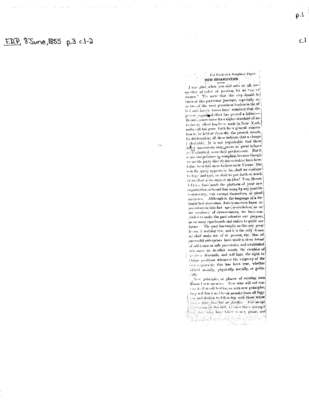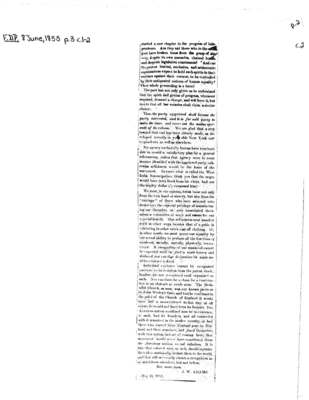Pages
D6799_Page_1
For the Frederick Douglass' Paper.
NEW ORGANIZATION.
I was glad when you said unto us all irrespective of color or postion , let us "GO UP HIGHER." Tis met that this step should be taken at this particular juncture, especially so, as two of the most prominentt leaders in the allied anti slavery forces have admitted that they present organized effort has proved a failure – Besides, a new move for a higher standard of anti-slavery effort has been made in New York, and a call has gone forth for a general convetion to be held at Syracuse the present month, for deliberation; all these indicate that a change is desirable. It is not improbable that these [illegible] movements may prove as great failures as is admitted, were their predeccessors. But it is not our province to complain, because though we are the party directly interested, we have heretofore been but mere lookers on in Vienna. But now the query appears to be, shall we continure to hope and wait, or shall we put forth so much of an effort as to suggest an idea? You, Messrs. [illegible], have made the platform of your new organization so broad tha none, by any possible contingency, can exempt themselves, or plead an excuse. Although in the language of a distinguished states-man, Americans even know no precedents in this fast age; nevertheless, as we are creatures of circumstances, we have concluded to make the past subserve to our purpose, as so many sign-boards and stakes to guide our future. The past has taught us this one great lesson, if nothing else, and it is the only lesson we shall make use of at present, viz: that all successful enterprises have made a clean breast of old issues as safe precedents, and established new ones; or, in other words, the excelsior of progress demands, and will have the right to change positions whenever the exigency of the case requires it; this has been true, whether viewed morally, physically, socially, or politically.
New principles, or phases of existing ones demand new agencies. New wine will not contin itself in old bottles; so with new principles; they will burst and break asunder from all fogyism and disdain to fellowship with those whose [illegible] [illegible] [illegible] but no further. For an apt [illegible] [illegible] of this fact, in [illegible] [illegible] [illegible] have taken a new phase, and started a new chapter in the progress of independence. Are they not those who in the north part have broke loose from the grasp of slavery, despite its own manacles, chained bonds and despotic legislative enactments? And can the present limited, exclusive, and aristocratic organizations expect to hold such spirits in their embrace against their consent, to be controlled by their antiquated notions of human equality? Their whole proceeding is a farce!
The past has not only given us to understand that the spirit and genius of progress, whenever required, demand a change, and will have it, but insists that all her votaries shall claim a similar change.
Thus the party aggrieved shall become the party interesed, and it is for said party to make the issue, and carve out the modus opeandi of its release. We are glad that a step toward that end has been already made, as developed recently in your able New York correspondents, as well as elsewhere.
No agency exclusively human have ever been able to mould a staisfactory plan for a general reformation, unless that agaency were in some manner identified with the aggrieved party; otherwise selfishness would be the basis of the movement. Instance what is called the West India Emancipation: think you that the negro would have been freed from his chain, had not the mighty dollar (!) ransomed him?
We must, in our opinion, break loose not only from the iron hand of slavery, but also from the "tutelage" of those who have assumed unto themselves the especial privilege of manufacturing our thoughts or have constituted themselves a committee of ways and means for our especial benefit. Our self-esteem must manifest itself in other ways besides that of a pride in exhibiting in other men's cast off clothing. Or, in other words, we must prove our equality by our actual ability to perform al the functions of manhood, socially, morally, physically, POLITICALLY. A recognition of our manhood cannot be expected until the fact is made known and declared, nor can that declaration be made until its existence is fixed.
Individual existence cannot be recognized previous to its isolation from the parent stock; families are not recognized until organized as such. Nor can there be a claim for a combination in an abstract or crude state. The Methodist Church as now, was not known previous to John Wesley's time; and had he continured in the pales of the Church of England, it would have had a non-existence to this day, a all events he would not have been its founder. The American nation would not now be in existence, as such, had its founders and all connected with it remained in the mother country, or had thos who started from England gone to Holland and there remained, and fused themselves with that nation instead of coming here; that movement would never have constitutd them the American nation, and so ad infinitum. it is time that colored men, as such, should organize their ideas nationally, declare them to the world, and that will necessarily ensure a recognition as so much from themselves; but not before.
But more anon.
J.W. ADAMS.
May 31, 1855.

